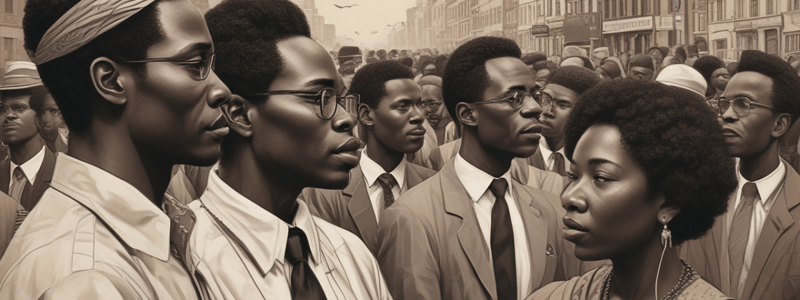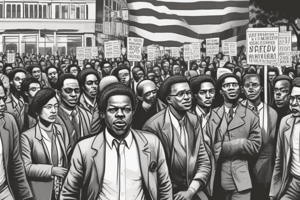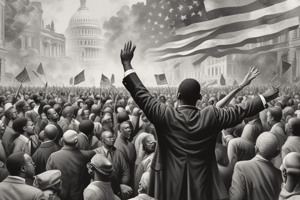Podcast
Questions and Answers
What is a reason why there is a higher proportion of Black women than White women in elected offices?
What is a reason why there is a higher proportion of Black women than White women in elected offices?
What did Linda Williams' 1987 study find about Black females?
What did Linda Williams' 1987 study find about Black females?
What was the focus of works by Terrelonge-Stone, Mae King, and Shelby Lewis?
What was the focus of works by Terrelonge-Stone, Mae King, and Shelby Lewis?
What did Ralph Bunche's 1934 dissertation on 'French Administration of Togoland and Dahomey' not advocate for?
What did Ralph Bunche's 1934 dissertation on 'French Administration of Togoland and Dahomey' not advocate for?
What was Ralph Bunche's later work, 'A World View of Race', known for?
What was Ralph Bunche's later work, 'A World View of Race', known for?
Why did Ralph Bunche refuse to publish his 1934 dissertation?
Why did Ralph Bunche refuse to publish his 1934 dissertation?
What was Ralph Bunche's later action towards his work 'A World View of Race' during the McCarthy era?
What was Ralph Bunche's later action towards his work 'A World View of Race' during the McCarthy era?
What has been the general approach of political science towards Africa?
What has been the general approach of political science towards Africa?
What has been the trend in the study of Africa in the academy?
What has been the trend in the study of Africa in the academy?
What has been the focus of U.S. foreign policy towards Africa?
What has been the focus of U.S. foreign policy towards Africa?
What event marked the beginning of a challenging period for Africans globally, according to the content?
What event marked the beginning of a challenging period for Africans globally, according to the content?
What was the focus of the Universal Negro Improvement Association (UNIA)?
What was the focus of the Universal Negro Improvement Association (UNIA)?
What was a consequence of the federal government's abandonment of Africans in the southern United States?
What was a consequence of the federal government's abandonment of Africans in the southern United States?
How did Africans respond to the rampant terror and abandonment by the U.S. government?
How did Africans respond to the rampant terror and abandonment by the U.S. government?
What characterized the works of the growing intelligentsia during this era?
What characterized the works of the growing intelligentsia during this era?
What was a notable aspect of the writers listed in this era?
What was a notable aspect of the writers listed in this era?
What period is associated with the intellectual production of the original builders of Black Studies?
What period is associated with the intellectual production of the original builders of Black Studies?
What was a consequence of Jim Crow racism and lynch mob terrorism?
What was a consequence of Jim Crow racism and lynch mob terrorism?
What was a benefit of the social relations that returned to pre-emancipation types in the South?
What was a benefit of the social relations that returned to pre-emancipation types in the South?
What was a characteristic of the Middle Group, according to Thorpe (1971)?
What was a characteristic of the Middle Group, according to Thorpe (1971)?
What is the primary goal of a social scientist according to Kirk and Miller (1989)?
What is the primary goal of a social scientist according to Kirk and Miller (1989)?
What is a challenge in carrying out epistemological inquiries on culture or place?
What is a challenge in carrying out epistemological inquiries on culture or place?
What is the value of oral and written expressions of African slaves?
What is the value of oral and written expressions of African slaves?
What is a problem in the teaching of Africa in African American degree programs?
What is a problem in the teaching of Africa in African American degree programs?
What is the focus of the article in terms of improving the teaching of Africa?
What is the focus of the article in terms of improving the teaching of Africa?
What is a key aspect of African American Studies as a researchable subject?
What is a key aspect of African American Studies as a researchable subject?
What is a challenge in developing curricula for African American Studies?
What is a challenge in developing curricula for African American Studies?
What is the significance of hermeneutical approach in understanding cultural and ethnic studies?
What is the significance of hermeneutical approach in understanding cultural and ethnic studies?
What is the role of African American instructors in teaching about Africa?
What is the role of African American instructors in teaching about Africa?
What is the focus of the article in reviewing the rationale for African American Studies programs?
What is the focus of the article in reviewing the rationale for African American Studies programs?
What was the primary goal of Blyden's rhetorical strategy?
What was the primary goal of Blyden's rhetorical strategy?
What was the significance of Blyden's close alliance with the American Colonization Society?
What was the significance of Blyden's close alliance with the American Colonization Society?
What was the focus of Garvey's ideological tenets in the early 20th century?
What was the focus of Garvey's ideological tenets in the early 20th century?
What was the characteristic of the African leadership structure during the early days of independence in Ghana?
What was the characteristic of the African leadership structure during the early days of independence in Ghana?
What was the significance of Nyerere's ujaama?
What was the significance of Nyerere's ujaama?
What was the focus of the ideology constructed in Diaspora?
What was the focus of the ideology constructed in Diaspora?
What was the aim of the American Colonization Society?
What was the aim of the American Colonization Society?
What was the significance of Blyden's rhetorical strategy in relation to African society?
What was the significance of Blyden's rhetorical strategy in relation to African society?
What was the primary goal of Garvey's rhetorical strategy?
What was the primary goal of Garvey's rhetorical strategy?
What was the characteristic of the African national definition in Blyden's ideology?
What was the characteristic of the African national definition in Blyden's ideology?
Study Notes
Civil Rights Organizations and Social Welfare Policies
- The dual agenda of civil rights organizations encompasses race and social welfare policies.
Key Scholars and Their Works
- Ralph Bunche: A prominent scholar who wrote on French administration of Togoland and Dahomey (1934) and A World View of Race (1936).
- Errol Henderson: Published Afrocentrism and World Politics: Toward a New Paradigm (1995) and promoted an Afrocentric approach to U.S. foreign policy.
- Henry Jackson: Wrote From the Congo to Soweto (1984), a standard text on Africa, and was a prominent figure in the study of Africa and the Diaspora.
- Ronald Walters: Published Pan Africanism in the African Diaspora (1993), providing a theoretical perspective to the study of Africa and the Diaspora.
- Karin Stanford: Authored Beyond the Boundaries (1997), a pioneering exploration of citizen diplomacy.
Study of Africa and the Diaspora
- Africa and U.S. foreign policy toward Africa have largely been ignored in the academy and political science.
- The social sciences, particularly history and anthropology, have been the leaders in African Studies.
- Early work in political science often supported colonialism and took a modernization/developmental approach toward Africa.
Gender and Politics
- Michael Dawson's Behind the Mule (1994) and Black Visions (2001) are standard-setting works in synthesizing data with theory and history on gender and politics.
- Studies by Robert Darcy and Charles Hadley (1988) found that a greater proportion of Black than White elected officials are women due to politicization of Black women, expanded political opportunities, and structural reforms.
- Works by Terrelonge-Stone (1979), Mae King (1975), and Shelby Lewis (1988) contest the view that sexism is a factor of minimal importance in the overall oppression of Black women.
Cultural Comparisons in Black Studies
- Cultural comparisons should consider each culture's involvement in and influence on science and technology, economic production and distribution, publishing and instruction, professional entertainment, and religion and language.
Factors to Highlight in Ideological Comparisons
- Themes and debates surrounding fields of study
- Key ideologues and their philosophies
- Pneumatology (study of spiritual beings and their relationships)
- Discussions of political loyalty
Disciplinary Approaches to Black Studies
- Afrocentric methods are the only disciplinary approaches to Black Studies
- Departments, programs, and professors using Afrocentric methods are the only ones considered part of Black Studies
Historical Context: Islamic Mercantilism and European Capitalist Expansion
- Islamic mercantilism led by Arabic culture played a significant role in the enslavement of Africans
- The legacy of Moorish tutelage of Spanish and Portuguese elites influenced European capitalist expansion
- The connection between Islamic mercantilism and European capitalist expansion characterizes the era of European colonialism
Key Figures and Their Contributions
- Molefi Asante (1990) wrote about Afrocentricity and knowledge in "Kemet, Afrocentricity, and Knowledge"
- Lincoln University alumnus and later President of Nigeria offered a course on Black Studies in 1933-1934
The Impact of Imperialism on Africa and the African Voice
- Centuries of usurpation by European capitalist powers led to the loss of material wealth, control of organized labor, and the "collective African voice" for African populations
- Imperialism required an assault on global consciousness to hide authentic achievements and contributors within human culture
- Institutions of intellectual production were established to remake history in the image of Western European aristocracy
- The past was hidden to remove any imagined future that might not be synchronized with imperial development
The African Renaissance and Black Studies
- Black Studies and Negro history are programmatic expressions of the African renaissance
- The African renaissance aimed to promote an accurate record of humanity's development
- The original builders of Black Studies were members of "The Middle Group" (1896-1930) who sought to unify African people globally
- UNIA (Universal Negro Improvement Association) and the Pan-African Congresses were key organizations that fired the enthusiasm of the African masses worldwide
African American Studies
- The poetry, letters, memoirs, and scientific inventions of Black people constitute the background for analyzing a collection of Black experiences.
- Sociocultural values developed by Africans and their descendants in Europe and South America have profoundly shaped global pop culture, politics, and economy.
Key Concepts
- The Afrocentric mind-set addresses:
- The connectedness and socio-cultural continuity of the African Diasporas
- The inclusiveness of all people and the need to live robustly
- The debate about what is passed down from one generation to another
- A more culturally oriented worldview over an individualistic one
- Modes and processes used in the study of contemporary African Diasporas
Historical and Social Context
- Blacks were collected from different tribes in Africa and experienced psychological hardships in Anglo-American, English, Spanish, and Portuguese plantations.
- They eventually settled in different regions of the Western hemisphere, incorporating European values with African values.
- Africa and the Diasporas will remain an intriguing subject for academic inquiry.
Curriculum Development
- To develop a curriculum, educators need to have a working knowledge of the group's value system.
- The African heritage extends to South America (Brazil, Cuba) and the Caribbean, and AAS curriculum should incorporate historical and contemporary experiences of Africans on the continent and in the Diasporas.
Education Research
- Education researchers have found lower achievement levels among African American learners compared to their Euro-American counterparts.
- The deficiency approach to the education of African Americans disregards the primary tenet of the constructionist philosophy.
Methodology
- The process of carrying out an epistemological inquiry on culture, subject, or place is challenging due to changing facts and personal bias.
- A hypothetical-deductive methodology is required for academic inquiry in AAS.
Instructional Problems
- Intellectual grandstanding by African American instructors when teaching students about Africa is a problem.
- Proposals in the areas of curricula, didactic, and resource allocation are needed for improvement in the teaching of Africa.
Mission and African Nationalist Ideology
- The ideology of African nationalism was constructed by articulate Africans in Diaspora, particularly Edward Wilmot Blyden, who envisioned a free Africa with Africans in control of their resources and destiny.
- Blyden was born in the Virgin Islands in 1832 and migrated to Liberia in 1851, where he spent the rest of his life traveling and fostering arguments for an African exodus from North America to found an independent African entity.
African Nationalist Theory and Development
- An African nationalist theory would address the need to develop and structure institutions and mechanisms to augment intra-Africa trade and North/South trade agreements, enhancing confidence in finished African products.
- Despite the creation of institutions such as the OAU and African Union, they mimic colonial power structures, explaining their ineffectiveness.
Cultural Dimension and Social Cohesion
- The cultural dimension is critical for preserving values that promote social cohesion, a sense of belongingness, harmony, and discipline.
- Inter-African and inter-cultural relations, central to creating unifying cultural norms, remain at obscure levels, restricted to sports like soccer and cricket.
African Philosophical and Religious Thought
- The idea of systematizing African philosophical thought, religious thought, or both as a corollary to an African nationalist theory does not seem to take hold at the continental level.
- Appeals to race pride combined with the apotheosis of African virtue projected an image filled with hope and a vision of a desirable society.
Influences and Legacy
- Marcus Garvey in the early 20th century adopted the same tenets of the rhetorical strategy used by Blyden, arguing for the consolidation of African interests in Africa, by Africans, and for Africans.
- Blyden's close alliance with the American Colonization Society aimed to repatriate freed Africans to Africa, highlighting the importance of African interests as the point of departure.
Studying That Suits You
Use AI to generate personalized quizzes and flashcards to suit your learning preferences.
Related Documents
Description
Chapter 13: African American Politics: The Black Studies Per- spective Chapter 14: Black Studies in the Historically Black Colleges and Universities Chapter 15: African American Studies Programs in North Ameri- ca and the Teaching of Africa: Myth, Reality, and Re- construction Chapter 16: An African Nationalist Ideology in Diaspora and the Development Quagmire: Political Implications




